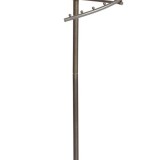Do Farmhouse Sinks Need A Special Drain?
Farmhouse sinks have become increasingly popular in recent years, adding a touch of rustic charm to kitchens. However, one question that often arises is whether or not these sinks require a special drain. In this article, we will delve into the essential aspects of farmhouse sink drains and provide a comprehensive guide to help you make an informed decision.
Drain Size and Compatibility
The most crucial factor to consider when choosing a drain for a farmhouse sink is its size. Farmhouse sinks typically have larger drain openings compared to standard sinks. Standard drains measure 1.5 inches in diameter, while farmhouse sinks often require a 3.5-inch drain. It is essential to select a drain that is compatible with the size of your sink's drain opening to ensure proper drainage and prevent leaks.
Basket Strainers and Stoppers
Basket strainers are a popular option for farmhouse sinks as they provide an additional layer of protection against clogging. These strainers feature a removable basket that catches debris and food particles, preventing them from entering the drainpipe. Additionally, farmhouse sinks often come with stoppers that allow you to fill the sink with water for various tasks such as washing dishes or soaking laundry. Choose a drain that includes both a basket strainer and a stopper to enhance functionality and convenience.
Drain Finish and Material
The finish and material of the drain should complement the aesthetics of your sink and kitchen décor. Farmhouse sinks are typically made from materials such as fireclay, ceramic, or stainless steel. Choose a drain that is made from a similar material to ensure a cohesive look. Additionally, consider the finish of the drain, whether it be brushed, polished, or oil-rubbed bronze, to match the design of your sink and kitchen hardware.
Installation Considerations
Installing a drain in a farmhouse sink is a relatively straightforward process, but it is essential to follow the manufacturer's instructions carefully. Most drains require you to apply plumber's putty or a rubber gasket around the drain flange to create a watertight seal. Ensure that the drain is properly seated and tightened to prevent leaks. If you are unsure about the installation process, it is recommended to consult a qualified plumber for assistance.
Maintenance and Care
Regular maintenance and care are crucial to extend the lifespan of your farmhouse sink and drain. To prevent clogging, empty the basket strainer frequently and dispose of any collected debris. Periodically clean the drain with a drain cleaner or baking soda and vinegar solution to remove any buildup or residue. Avoid using harsh chemicals or abrasive cleaners, as these can damage the finish of the drain.
Conclusion
Choosing the right drain for a farmhouse sink is essential to ensure proper drainage, functionality, and aesthetics. By considering the factors outlined in this article, you can make an informed decision that will enhance the beauty and practicality of your kitchen.

Do Farmhouse Sinks Need A Special Drain We Have The Answer In 2024 Sink Installation Diy Industrial Home Decor Farm House Living Room

What To Know Before A Farmhouse Sink Houseful Of Handmade

What To Know Before A Farmhouse Sink Houseful Of Handmade

Installing A Farmhouse Sink Fine Homebuilding

How To Install A Fireclay Farmhouse Kitchen Sink The Wheatley Sinkology
Farmhouse Sink Guide Signature Hardware

36 Inch Fireclay Farmhouse Sink With Side Drain Multiple Colors

Ruvati 30 In Single Bowl Farmhouse Fireclay Kitchen Sink With Right Offset Drain White Rvl2024wr The Home Depot

Apron Front Farmhouse Sink Options And Why I Decided Against Fireclay Victoria Elizabeth Barnes

What To Know Before A Farmhouse Sink Houseful Of Handmade








